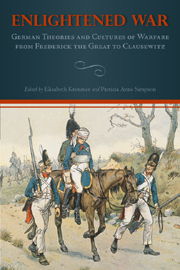Book contents
- Frontmatter
- Contents
- List of Illustrations
- Acknowledgments
- Introduction: Enlightened Warfare in Eighteenth-Century Germany
- Part I War and Enlightenment
- Part II Cultures of War in Classicism and Romanticism
- Part III War and Gender
- 7 On Gender Wars and Amazons: Therese Huber on Terror and Revolution
- 8 Angelica Kauffmann's War Heroes: (Not) Painting War in a Culture of Sensibility
- 9 Citizen-Soldiers: General Conscription in the Nineteenth and Twentieth Centuries
- Part IV War and Theory
- Bibliography
- Notes on the Contributors
- Index
7 - On Gender Wars and Amazons: Therese Huber on Terror and Revolution
from Part III - War and Gender
Published online by Cambridge University Press: 05 February 2013
- Frontmatter
- Contents
- List of Illustrations
- Acknowledgments
- Introduction: Enlightened Warfare in Eighteenth-Century Germany
- Part I War and Enlightenment
- Part II Cultures of War in Classicism and Romanticism
- Part III War and Gender
- 7 On Gender Wars and Amazons: Therese Huber on Terror and Revolution
- 8 Angelica Kauffmann's War Heroes: (Not) Painting War in a Culture of Sensibility
- 9 Citizen-Soldiers: General Conscription in the Nineteenth and Twentieth Centuries
- Part IV War and Theory
- Bibliography
- Notes on the Contributors
- Index
Summary
Enlightened War
THE EIGHTEENTH CENTURY WAS NOT only the Age of Enlightenment, it was also an epoch marked by extreme violence and numerous wars. Above all, the violent upheaval in the wake of the French Revolution, especially after the execution of the king, raised doubts among contemporaries about whether the Enlightenment and its advocacy of freedom, equality, and human rights were capable of promoting the moral and social refinement of humankind, or rather heralded a new barbarism. The debate over the proper relation between enlightenment and revolution thus formed an integral part of a comprehensive political and philosophical discourse about the proper relation between theory and praxis. The question of violence in particular proved divisive. Does a nation have the right to rebel against a tyrannical government? Which types of violence are acceptable? Under what circumstances is war justifiable? How should one draw the line between defensive warfare and wars of conquest? Who emerges victorious, and who is a victim of war? Is it even possible to avoid war or is war an inescapable fact of human life? Certainly the eighteenth century was not the first to ask these questions, but the violent course of the French Revolution and the ensuing revolutionary wars endowed them with renewed urgency and poignancy.
- Type
- Chapter
- Information
- Enlightened WarGerman Theories and Cultures of Warfare from Frederick the Great to Clausewitz, pp. 175 - 191Publisher: Boydell & BrewerPrint publication year: 2011

